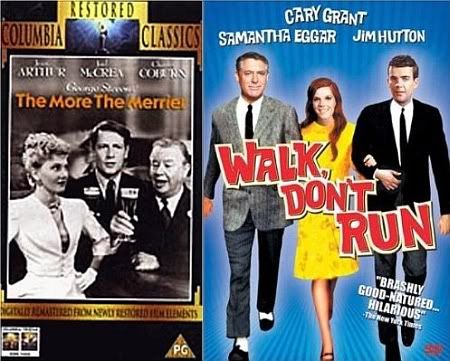
TCM is showing The More The Merrier at 1:30 PM ET on September 16. As I've mentioned before, it's the original version of Walk, Don't Run. I greatly enjoy both versions, although each has its own advantages.
The More The Merrier is set in Washington, DC, in 1943, during World War II, when there was a severe housing shortage due to all the people coming to our nation's capital to do government work. Charles Coburn plays the wealthy businessman coming to the big city for an important meeting; Jean Arthur the woman with an oversized apartment; and Joel McCrea the young man also loking for a place to stay. One of the big differences between this version and Walk, Don't Run is that McCrea is playing an army officer, making giving him a place to stay a bit more likely than some random Olympic athlete. However, it's one of the casting decisions that makes The More The Merrier so wonderful: Charles Coburn as the older man. By the time Cary Grant reached the end of his career, he had been typecast as an elegant, but suave, older gentleman whom the ladies still liked. As a result, there's an expectation of romantic tension between Grant and Samanta Eggar that really doesn't fit in well with the plot. Charles Coburn, on the other hand, was never really a ladies' man in the movies. His movie career didn't take off until he was sixty, at which point he was in almost in constant demand for the next twenty years. Being known only as an older actor, he had none of the romantic charm that Grant had -- and in this story, that's a huge plus. Not only that, but several of Coburn's characters (eg. The Devil and Miss Jones and Heaven Can Wait) are mischievous, a trait that Coburn carries into The More The Merrier. And when your character is playing Cupid for an engaged woman and a man who's almost a stranger to her, mischief really helps. Grant doesn't quite have it.
The two young couples are a wash. Jim Hutton and Samantha Eggar don't have the heft that McCrea and Arthur do, but they're both quite good, and do a fine job in what is really just a light romantic comedy. Heft isn't all that important. McCrea and Arthur, however, have the best romantic scene in either of the two movies, when they get a kiss outside Arthur's apartment that is surpisingly erotic, considering that the movie was released in 1943.
Walk, Don't Run has a big superiority in its ending, however. The two movies are supposed to be romantic comedies, and the point at which Coburn convinces McCrea and Arthur to go through with a wedding ceremony turns the movie into something rather more maudlin. Jean Arthur spends much of the last twenty minutes of The More The Merrier crying her way through proceedings, and it's something that really doesn't work. In Walk, Don't Run, things are handled much more deftly. Also, the very final scene, in which the two young lovers receive the ultimate get-together, is carried off much more naturally.
Both movies are available on DVD, so you can watch and judge the merits of the two for yourself any time you want. Even if you don't want to compare them, watching either is a night at the movies well-spent.
2026 Oscar Nominated Shorts
3 hours ago

No comments:
Post a Comment